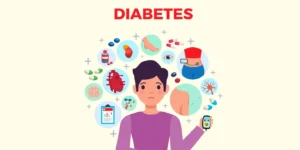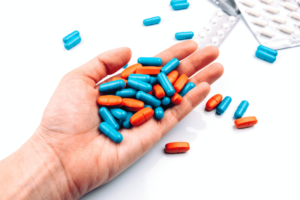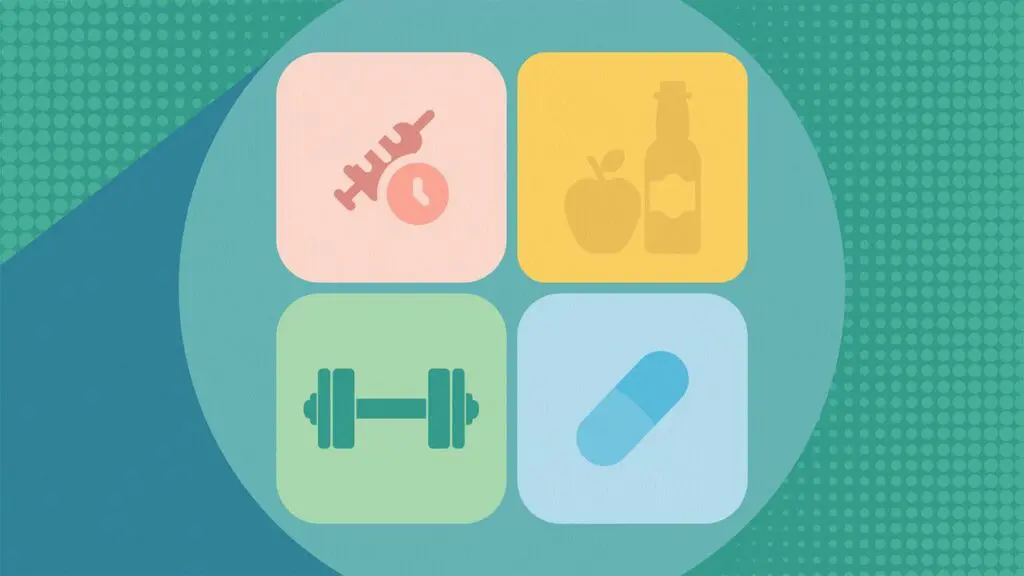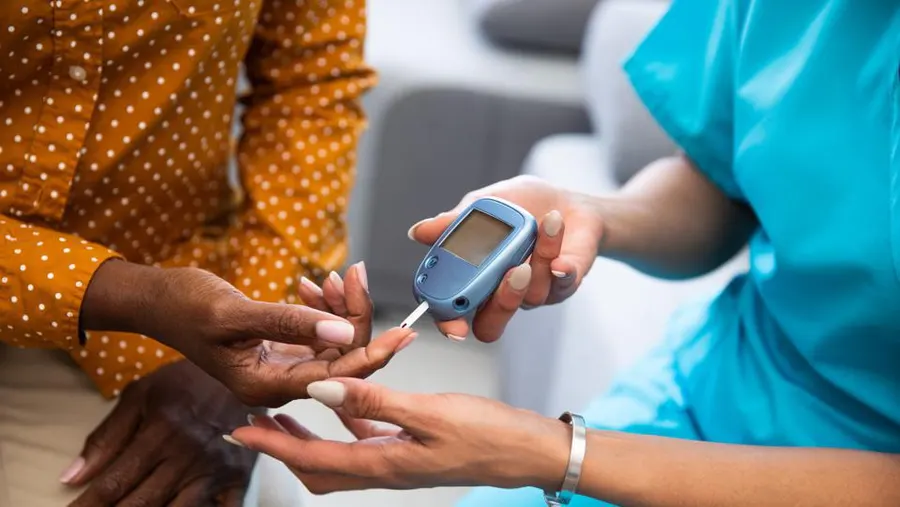Treatment Options for Type 2 Diabetes: Type 2 diabetes is a chronic condition characterized by high blood sugar levels resulting from insulin resistance and relative insulin deficiency. With its prevalence rising globally, effective management of type 2 diabetes is imperative to reduce the risk of complications and improve overall health. Fortunately, there are various treatment options available, ranging from lifestyle modifications to medications and insulin therapy. In this comprehensive guide, we’ll explore the diverse array of treatment options for type 2 diabetes.
Contents
What is Type 2 Diabetes?

Type 2 diabetes is a chronic metabolic disorder characterized by high blood sugar levels (hyperglycemia) resulting from the body’s inability to effectively use insulin or insufficient production of insulin by the pancreas. Insulin is a hormone produced by the pancreas that helps regulate blood sugar levels by facilitating the uptake of glucose into cells for energy or storage.
In type 2 diabetes, cells become resistant to the action of insulin, meaning they don’t respond properly to its signals, leading to elevated blood sugar levels. Over time, the pancreas may also lose its ability to produce enough insulin to compensate for this resistance, further exacerbating hyperglycemia.
Several factors contribute to the development of type 2 diabetes, including genetics, lifestyle factors (such as obesity, sedentary lifestyle, and poor diet), and metabolic syndrome. Unlike type 1 diabetes, which typically develops during childhood or adolescence and results from autoimmune destruction of insulin-producing beta cells in the pancreas, type 2 diabetes often occurs in adults and is associated with lifestyle and genetic factors.
Is Type 2 Diabetes Treatable?
Yes, type 2 diabetes is treatable. With appropriate management strategies, individuals with type 2 diabetes can effectively control their blood sugar levels, reduce the risk of complications, and improve their overall health and well-being.
Treatment typically involves a combination of lifestyle modifications and medications tailored to each individual’s needs. While type 2 diabetes requires ongoing attention and monitoring, many people can successfully manage the condition and lead fulfilling lives with proper care and support from healthcare providers.
Different Treatment Options for Type 2 Diabetes
Managing type 2 diabetes involves a multifaceted approach tailored to each person’s unique needs and circumstances. Here are some treatment options that can help you manage it:
Lifestyle Modifications

Dietary Changes:
- Adopting a balanced diet rich in fruits, vegetables, whole grains, lean proteins, and healthy fats.
- Limiting intake of sugary beverages, processed foods, and high-carbohydrate foods.
- Monitoring portion sizes and carbohydrate intake to help regulate blood sugar levels.
- Incorporating meal planning and mindful eating habits to maintain consistency in dietary choices.
Regular Exercise:
- Engaging in aerobic exercises such as walking, cycling, swimming, or dancing for at least 150 minutes per week.
- Incorporating strength training exercises to build muscle mass, improve insulin sensitivity, and enhance metabolic health.
- Establishing a consistent exercise routine and gradually increasing intensity and duration over time.
- Finding enjoyable physical activities to promote long-term adherence and overall well-being.
Weight Management:
- Setting realistic weight loss goals based on individual needs and health status.
- Implementing strategies for calorie reduction, such as portion control and mindful eating.
- Increasing physical activity levels to support weight loss efforts and improve metabolic health.
- Seeking guidance from healthcare professionals, dietitians, or weight loss programs for personalized support and accountability.
Oral Medications

Metformin:
- Metformin is the first-line medication for type 2 diabetes, working primarily by reducing glucose production in the liver and improving insulin sensitivity in peripheral tissues.
- It is typically taken orally once or twice daily with meals and is well-tolerated by most individuals.
- Metformin may also help with weight management and reduce the risk of cardiovascular complications.
Sulfonylureas:
- Sulfonylureas stimulate insulin secretion from the pancreas, helping to lower blood sugar levels.
- Commonly prescribed sulfonylureas include glyburide, glipizide, and glimepiride.
- Potential side effects include weight gain and hypoglycemia, especially in elderly individuals or those with kidney impairment.
DPP-4 Inhibitors:
- Dipeptidyl peptidase-4 (DPP-4) inhibitors enhance the action of incretin hormones, which stimulate insulin release and inhibit glucagon secretion, resulting in lower blood glucose levels.
- Examples include sitagliptin, saxagliptin, linagliptin, and alogliptin.
- DPP-4 inhibitors are generally well-tolerated and have a low risk of hypoglycemia.
Injectable Medications
GLP-1 Receptor Agonists:
- GLP-1 receptor agonists mimic the action of incretin hormones, stimulating insulin secretion, suppressing glucagon release, slowing gastric emptying, and promoting satiety.
- These medications can lead to significant improvements in blood sugar control and weight management.
- Examples include exenatide, liraglutide, dulaglutide, and semaglutide, available in both short-acting and long-acting formulations.
Insulin Therapy:
- Insulin therapy may be necessary when oral medications are no longer sufficient to control blood sugar levels adequately.
- Various types of insulin are available, including rapid-acting, short-acting, intermediate-acting, and long-acting formulations.
- Insulin regimens are tailored to individual needs, considering factors such as meal patterns, activity levels, and glycemic targets.
Bariatric Surgery
Gastric Bypass:
- Gastric bypass surgery involves creating a small pouch in the stomach and rerouting the small intestine to bypass a portion of the digestive tract.
- This procedure restricts food intake and alters the absorption of nutrients, leading to significant weight loss and improvements in metabolic health.
- Gastric bypass surgery has been shown to induce remission of type 2 diabetes in many patients.
Sleeve Gastrectomy:
- Sleeve gastrectomy involves removing a portion of the stomach to create a smaller, sleeve-shaped pouch.
- This procedure reduces stomach capacity and limits food intake, leading to weight loss and metabolic improvements.
- Sleeve gastrectomy has demonstrated favorable outcomes in terms of diabetes remission and metabolic control.
Continuous Glucose Monitoring (CGM) and Insulin Pump Therapy
Continuous Glucose Monitoring (CGM):
- CGM systems continuously monitor glucose levels throughout the day and night, providing real-time data and trends to help individuals make informed decisions about insulin dosing, diet, and physical activity.
- CGM systems consist of a sensor worn on the body, which measures glucose levels in interstitial fluid and a transmitter that sends data to a receiver or smartphone app.
- CGM can help improve glycemic control, reduce the risk of hypoglycemia, and optimize insulin therapy.
Insulin Pump Therapy:
- Insulin pump therapy delivers insulin continuously through a small device worn on the body, replacing the need for multiple daily insulin injections.
- Insulin pumps offer greater flexibility in insulin dosing, allowing for precise adjustments based on individual needs, meal patterns, and activity levels.
- Pump therapy can improve glycemic control, enhance quality of life, and reduce the burden of diabetes management compared to multiple daily injections.
Education and Support

Diabetes Self-Management Education (DSME):
- DSME programs provide individuals with type 2 diabetes and their caregivers with essential knowledge and skills for managing the condition effectively.
- Topics covered may include diabetes self-monitoring, medication management, nutrition therapy, physical activity, coping strategies, and problem-solving skills.
- DSME programs empower individuals to take an active role in their diabetes care and make informed decisions to optimize health outcomes.
Support Groups:
- Diabetes support groups offer a valuable source of encouragement, empathy, and practical advice for individuals living with type 2 diabetes.
- Support groups provide a forum for sharing experiences, discussing challenges, and learning from others facing similar struggles.
- Participation in support groups can reduce feelings of isolation, improve self-esteem, and promote adherence to diabetes management strategies.
Complementary and Alternative Therapies
Mind-Body Practices:
- Mind-body practices such as yoga, meditation, and tai chi can help reduce stress, improve emotional well-being, and promote relaxation.
- These practices may complement conventional diabetes management by enhancing self-awareness, resilience, and coping skills.
Herbal Supplements:
- Some herbal supplements, such as cinnamon, fenugreek, and bitter melon, have been studied for their potential benefits in blood sugar control.
- While research on the efficacy and safety of herbal supplements for type 2 diabetes is ongoing, it’s essential to consult with healthcare professionals before incorporating them into diabetes management plans.
Acupuncture:
- Acupuncture, a traditional Chinese medicine practice involving the insertion of thin needles into specific points on the body, has been explored as a complementary therapy for managing diabetes-related symptoms.
- While acupuncture may provide relief from pain, neuropathy, and other diabetes-related complications for some individuals, more research is needed to determine its effectiveness and mechanisms of action.
Which Treatment Method is Best for Type 2 Diabetes?

Determining the “best” treatment method for type 2 diabetes depends on various factors, including individual characteristics, preferences, and medical history. What works well for one person may not be as effective for another. Healthcare providers typically tailor treatment plans to each patient’s specific needs, considering factors such as:
- Blood Sugar Levels: The primary goal of treatment is to achieve and maintain optimal blood glucose control, as indicated by regular monitoring of hemoglobin A1c (HbA1c) levels.
- Overall Health: Treatment plans take into account a person’s overall health status, including any comorbid conditions such as cardiovascular disease, kidney disease, or obesity.
- Lifestyle Factors: Lifestyle modifications, including diet, exercise, and weight management, play a crucial role in diabetes management and are often the first line of treatment.
- Medication Tolerance and Side Effects: Individual responses to medications vary, and healthcare providers consider factors such as medication tolerance, potential side effects, and drug interactions when prescribing medications.
- Treatment Goals: Treatment plans are according to each person’s goals. This may include achieving weight loss, improving blood pressure and cholesterol levels, or reducing the risk of diabetes-related complications.
- Patient Preferences: Patient preferences and lifestyle factors are important considerations in treatment decisions. Some individuals may prefer oral medications over injectable therapies or may have preferences regarding treatment frequency and administration.
Ultimately, the “best” treatment method for type 2 diabetes is one that effectively controls blood sugar levels, fits the individual’s lifestyle, minimizes the risk of complications, and promotes overall health and well-being. It often involves a combination of lifestyle modifications, medications, and regular monitoring, with ongoing communication and collaboration between the patient and healthcare provider to adjust treatment as needed.
Conclusion
Effective management of type 2 diabetes requires a multifaceted approach tailored to individual needs and preferences. Lifestyle modifications, including diet, exercise, and weight management, form the foundation of treatment. Oral medications, injectable therapies, and advanced interventions such as bariatric surgery may be utilized to achieve and maintain optimal blood sugar control.
Regular monitoring of blood glucose levels and ongoing collaboration with healthcare providers are essential for successful diabetes management. It also helps in reducing the risk of complications. By adopting a comprehensive treatment strategy, individuals with type 2 diabetes can lead healthier, more fulfilling lives.
Do you want to get rid of diabetes? Join our online diabetes treatment program and reverse Diabetes naturally through lifestyle changes such as a Personalized Diet plan, Exercise, Yoga, dieticians, and health coaches.

